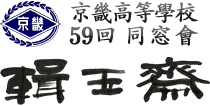Turkey referendum grants President Erdogan sweeping new powers

President Recep Tayyip Erdogan: "Decision made by the Turkish public is a historic moment"
Turkish President Recep Tayyip Erdogan has narrowly won a referendum to expand presidential powers, which could keep him in office until 2029.
With 99.45% of ballots counted, the "Yes" campaign had won 51.37% and "No" 48.63%, and the electoral board called victory for "Yes".
Erdogan supporters say replacing the parliamentary system with an executive presidency will modernise the country.
Turkey's two main opposition parties said they would challenge the results.
The Republican People's Party (CHP) demanded a recount of 60% of votes. They criticised a decision to accept unstamped ballot papers as valid unless proven otherwise.
As jubilant Erdogan supporters rallied in the big cities, pots and pans were banged in Istanbul by opponents of the referendum, in a traditional form of protest.
Three people were shot dead near a polling station in the south-eastern province of Diyarbakir, reportedly during a dispute over how they were voting.
The European Commission called on the Turkish authorities in a statement to "seek the broadest possible national consensus" when implementing the constitutional reforms.
Lingering doubts: BBC's Mark Lowen in Ankara
 Image copyright EPA
Image copyright EPA They are rejoicing into the night here outside the headquarters of the governing AK party (AKP), confident in the victory claimed by President Erdogan.
He and his government say more than 51% of voters have backed the constitutional reform but the opposition has cried foul, claiming massive irregularities over invalid votes and vowing to challenge the result at the supreme electoral board.
Mr Erdogan said the clear victory needed to be respected. In a typically rabble-rousing speech, he proposed another referendum on reinstating the death penalty, which would end Turkey's EU negotiations.
But this has not been the resounding win he wanted and doubts will linger over its legitimacy. It was hoped this vote might bring Turkey stability but that still seems some way off.
Death penalty next?
"Today... Turkey has taken a historic decision," Mr Erdogan told a briefing at his official Istanbul residence, the Huber Palace. "With the people, we have realised the most important reform in our history."
He called on everyone to respect the outcome of the vote.
The president also said the country could hold a referendum on bringing back the death penalty.
He usually gives triumphant balcony speeches, the BBC's Mark Lowen notes, but this was a muted indoors address.
Deputy Prime Minister Veysi Kaynak admitted the "Yes" vote had been lower than expected.
What's in the new constitution?
The draft states that the next presidential and parliamentary elections will be held on 3 November 2019.
The president will have a five-year tenure, for a maximum of two terms.
- The president will be able to directly appoint top public officials, including ministers
- He will also be able to assign one or several vice-presidents
- The job of prime minister, currently held by Binali Yildirim, will be scrapped
- The president will have power to intervene in the judiciary, which Mr Erdogan has accused of being influenced by Fethullah Gulen, the Pennsylvania-based preacher he blames for the failed coup in July
- The president will decide whether or not impose a state of emergency
'French-style system'
Mr Erdogan says the changes are needed to address Turkey's security challenges nine months after an attempted coup, and to avoid the fragile coalition governments of the past.
The new system, he argues, will resemble those in France and the US and will bring calm in a time of turmoil marked by a Kurdish insurgency, Islamist militancy and conflict in neighbouring Syria, which has led to a huge refugee influx.
Critics of the changes fear the move will make the president's position too powerful, arguing that it amounts to one-man rule, without the checks and balances of other presidential systems such as those in France and the US.
They say his ability to retain ties to a political party - Mr Erdogan could resume leadership of the AKP he co-founded - will end any chance of impartiality.
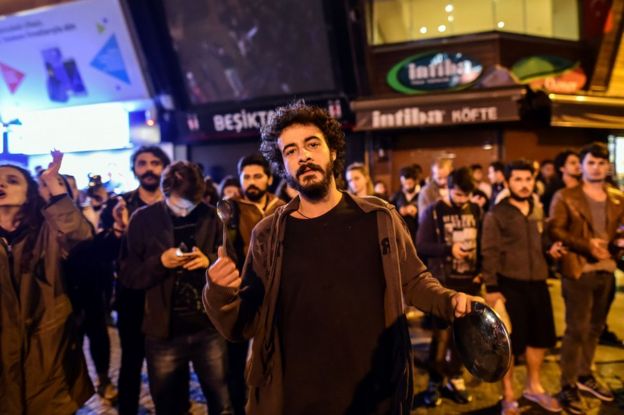 Image copyright AFP Image caption Some protesters banged pots and pans in the Turkish capital after the results were announced
Image copyright AFP Image caption Some protesters banged pots and pans in the Turkish capital after the results were announced CHP deputy leader Erdal Aksunger said he believed there had been irregularities in the count: "Many illegal acts are being carried out in favour of the 'Yes' campaign right now.
"There is the state on one side and people on the other. 'No' will win in the end. Everybody will see that."
The pro-Kurdish Peoples' Democratic Party (HDP) also challenged the vote.
Critics abroad fear Erdogan's reach
The day a Turkish writer's life changed
Emergency rule
Many Turks already fear growing authoritarianism in their country, where tens of thousands of people have been arrested, and at least 100,000 sacked or suspended from their jobs, since a coup attempt last July.
The campaign unfolded under a state of emergency imposed in the wake of the failed coup.
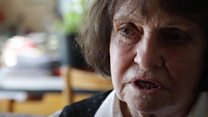
Turkish academic Oget Oktem Tanor, 82, voices her fears for her country
Mr Erdogan assumed the presidency, meant to be a largely ceremonial position, in 2014 after more than a decade as prime minister.
Under his rule, the middle class has ballooned and infrastructure has been modernised, while religious Turks have been empowered.
Relations with the EU, meanwhile, have deteriorated. Mr Erdogan sparred bitterly with European governments who banned rallies by his ministers in their countries during the referendum campaign. He called the bans "Nazi acts".
The ultranationalists who could sway Erdogan
3權 장악한 63세 에르도안, 최대 80세까지 사실상 '제왕'
입력 : 2017.04.18 03:15
- 터키 개헌 국민투표 통과
법률에 준하는 행정명령권 갖고 대법관 13명 중 5명 임명 가능
새 헌법으로 10년간 대통령 한 후 2029년 早期대선 땐 5년 더 집권
부정투표 논란… 野 불복 움직임, 사형제 추진으로 유럽과도 갈등
16일(현지 시각) 터키가 국민투표를 통해 정치 권력 구조를 의원내각제에서 대통령중심제로 바꾸는 개헌안을 통과시키자 외신들은 "터키의 모든 권력이 레제프 타이이프 에르도안(63) 대통령 손에 들어가게 됐다"고 평가했다. 영국 일간 파이낸셜타임스는 "이번 개헌안은 지난 10여 년 동안 터키의 모든 국가기관을 길들여 자신에게 복종하게 만들려던 에르도안의 숙원을 풀어줬다"고 했다.
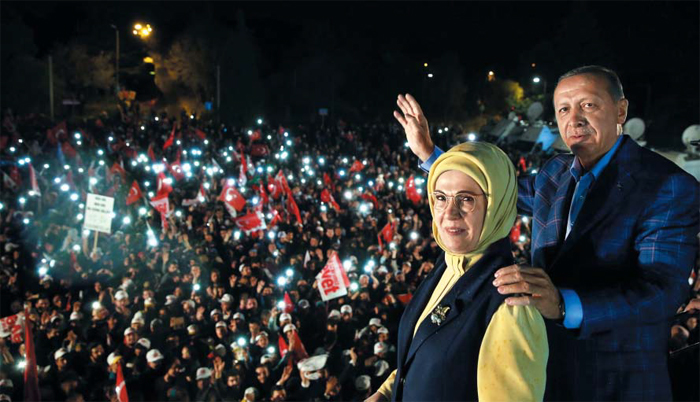 국민투표로 개헌안이 통과된 16일(현지 시각) 에르도안(맨 오른쪽) 터키 대통령과 영부인 에미네 여사가 이스탄불에서 열린 개헌 찬성 집회에 참석해 지지자들에게 손을 흔들고 있다. 이에 따라 터키의 국부(國父) 무스타파 케말 아타튀르크가 1923년 공화국을 수립해 채택한 의원내각제는 94년 만에 막을 내렸고 대통령 권한은 막강해졌다. /EPA 연합뉴스
국민투표로 개헌안이 통과된 16일(현지 시각) 에르도안(맨 오른쪽) 터키 대통령과 영부인 에미네 여사가 이스탄불에서 열린 개헌 찬성 집회에 참석해 지지자들에게 손을 흔들고 있다. 이에 따라 터키의 국부(國父) 무스타파 케말 아타튀르크가 1923년 공화국을 수립해 채택한 의원내각제는 94년 만에 막을 내렸고 대통령 권한은 막강해졌다. /EPA 연합뉴스CNN은 "대통령 임기는 5년으로 1회에 한해 중임(重任)할 수 있는데 새 헌법에 따른 대선이 2019년 실시되기 때문에 에르도안은 오는 2029년까지 대통령직을 유지할 수 있다"고 했다. 여기에 새 헌법은 대통령에게 조기 대선 실시 권한을 부여하고, 현직 대통령이 다시 출마할 수 있도록 허용해 이론적으론 임기 만료 직전 조기 대선을 시행하면 에르도안이 2034년까지 집권할 수 있다는 분석도 나온다.
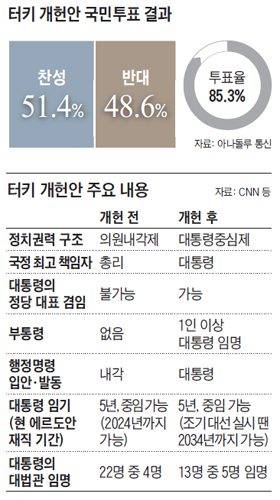
대통령이 행정뿐 아니라 입법·사법 영역까지 막강한 영향력을 행사할 체계도 갖춰졌다. 현재는 대통령이 정당 대표 등을 맡지 못하도록 하고 있지만 새 헌법은 이를 허용해 대통령이 정당을 지배할 수 있도록 했다. 대통령은 또 의회와 상의 없이 단독으로 의회를 해산할 수 있고, 국가비상사태 선포권도 갖게 됐다. 이와 함께 대법관 임명 권한 확대 등을 통해 사법부 영역까지 영향력을 발휘할 수 있게 됐다. 미국 싱크탱크인 '중동 민주화 프로젝트'의 하워드 아이젠스타트 교수는 "개헌으로 에르도안의 개인 권력이 놀랄 만큼 극대화됐다"며 "이는 터키 정치의 '견제와 균형'에 치명타가 될 수 있다"고 했다.
개헌안 통과는 에르도안 개인의 인기와 국정 능력, 테러·이민 문제 등 주변 여건이 맞물린 결과라는 분석이 제기된다. 에르도안은 2003~2014년 총리 재직 시절 터키 경제를 크게 발전시켜 국민들의 큰 지지를 받았다. 그가 총리를 맡은 동안 1인당 GDP는 연평균 3.6%씩 늘어났고, 물가 상승률은 32%에서 9%로 떨어졌다. 에르도안은 또 국민 대다수를 차지하는 이슬람교 전통을 강조하고, 지방 소도시·저학력층을 공략하는 한편 외국과의 갈등을 부각시켜 보수·민족주의적 표심을 자극하는 전략을 구사했다.
반면 제왕적 대통령 시대가 되면 터키가 국내외적으로 더욱 불안정해질 수 있다는 진단도 나온다. 공화인민당(CHP) 등 야당은 이번 선거에서 대대적 불법이 자행됐다며 불복 움직임을 보이고 있다. "선관위 날인이 없는 투표용지가 유효표로 처리되는 등 선거 결과를 인정할 수 없는 일이 벌어졌다"는 것이다. CHP 측은 "투표함의 37~60%에 문제가 있다"며 "250만표에 대해 이의를 제기할 것"이라고 했다. 이번 선거에서 찬성표는 51.4%로 반대(48.6%)에 비해 불과 2.8%포인트 많았다. 작년 7월 군부 쿠데타 실패 이후 13만명을 숙청하고 4만5000명을 구속하는 등 반대파를 억압하는 것도 국내 갈등을 부추길 수 있는 요소로 지적된다.
유럽 등 서방세계와의 마찰이 더 커질 것이란 전망도 나온다. 에르도안 대통령은 "의회가 사형제를 부활시키지 못하면 국민투표에 부칠 것"이라고 했다. 이에 유럽연합과 독일·프랑스 등은 "터키가 사형제를 다시 도입하면 터
키의 EU 가입 추진은 완전 물 건너갈 것"이라고 경고한다. 각국 헌법재판 기구 협의체인 베니스위원회도 "새 헌법은 터키의 입헌 민주주의 전통에 역행하는 위험한 시도로, 전제주의와 1인 지배에 이를 수 있다"고 우려했다. 뉴욕타임스는 "에르도안은 국민투표를 통해 국정안정과 경제성장이란 두 마리 토끼를 잡으려고 하겠지만, 결과는 그 반대일 수 있다"고 했다.
출처 : http://news.chosun.com/site/data/html_dir/2017/04/18/2017041800318.html
